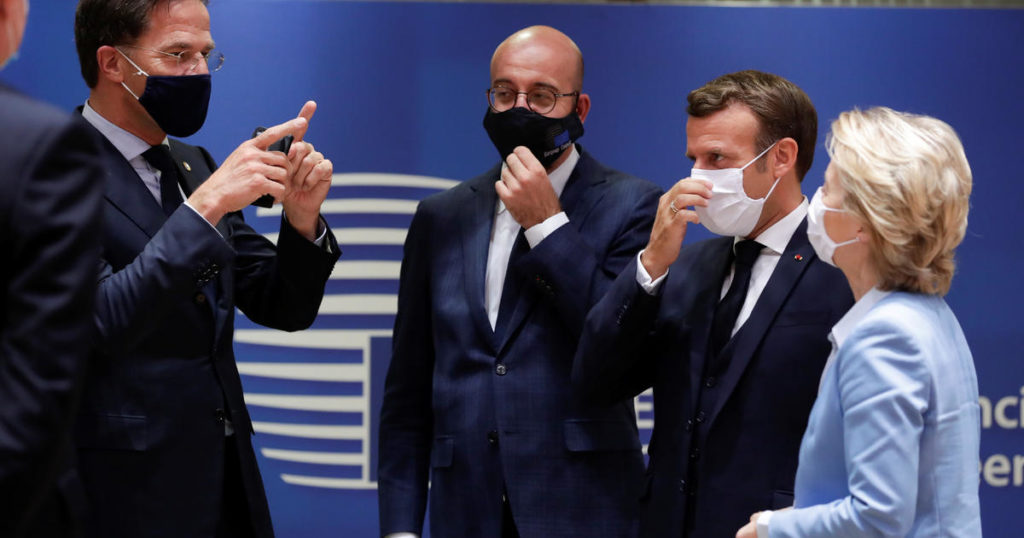European Union leaders have agreed on a 1.8 trillion-euro ($2.1 trillion) budget and coronavirus recovery fund to help fight the economic recession occasioned by the COVID-19 pandemic.

The deal was reached early on Tuesday after a summit that lasted for four days.
The 27 leaders grudgingly committed to a costly, massive aid package for those hit hardest by COVID-19, which has already killed 135,000 people within the bloc alone.
With masks and hygienic gel everywhere at the summit, the leaders were constantly reminded of the potent medical and economic threat the virus poses.
“Extraordinary events, and this is the pandemic that has reached us all, also require extraordinary new methods,” German Chancellor Angela Merkel said.
To confront the biggest recession in its history, the EU will establish a 750 billion-euro coronavirus fund, partly based on common borrowing, to be sent as loans and grants to the hardest-hit countries. That is in addition to the agreement on the seven-year, 1 trillion-euro EU budget that leaders had been haggling over for months even before the pandemic.
“The consequences will be historic,” French President Emmanuel Macron said. “We have created a possibility of taking up loans together, of setting up a recovery fund in the spirit of solidarity,” a sense of sharing debt that would have been unthinkable not so long ago.
Merkel added: “We have laid the financial foundations for the EU for the next seven years and came up with a response to this arguably biggest crisis of the European Union.”
Despite Macron and Merkel negotiating as the closest of partners, the traditionally powerful Franco-German alliance struggled for days to get the quarreling nations in line. But, even walking out of a negotiating session in protest together over the weekend, the two leaders bided their time and played their cards right in the end.
“When Germany and France stand together, they can’t do everything. But if they don’t stand together, nothing is possible,” said Macron, challenging anyone in the world who criticized the days of infighting to think of a comparable joint endeavor.
“There are 27 of us around the table and we managed to come up with a joint budget. What other political area in the world is capable of that? None other,” Macron said.
At first, Merkel and Macron wanted the grants to total 500 billion euros, but the so-called “frugals” — five wealthy northern nations led by the Netherlands — wanted a cut in such spending and strict economic reform conditions imposed. The figure was brought down to 390 billion euros, while the five nations also got guarantees on reforms.
“There is no such thing as perfection, but we have managed to make progress,” Macron said.
The summit, at the urn-shaped Europa center, laid bare how nations’ narrow self-interests trumped the obvious common good for all to stand together and face a common adversary.
Rarely had a summit been as ill-tempered as this one, and it was the longest since a five-day summit in Nice, France, in 2000, when safeguarding national interests in institutional reforms was a stumbling block.
“There were extremely tense moments,” Macron said.
Still, considering every EU leader had the right of veto on the whole package, the joint commitment to invest and spend such funds was hailed as a success.
“We all can take a hit,” said Dutch Prime Minister Mark Rutte. “After all, there are presidents among us.”
Despite bruising confrontations with Merkel, Macron and his Italian counterpart, Giuseppe Conte, Rutte maintained that “we have very good, warm relations.”
Conte also didn’t have time to dwell on grudges. With 35,000 Italians dead from COVID-19 and facing EU estimates his economy will plunge 11.2% this year, he had to think ahead, of things big and small — from getting cash to businesses still trying to get a foothold after the lockdown to getting school desks.
In order to open in September, his country needs up to 3 million new desks, to replace old-fashioned double and triple desks so students can keep a proper distance.
“We will have a great responsibility. With 209 billion euros, we have the possibility to relaunch Italy with strength, to change the face of the country. Now we must hurry. We must use this money for investments, for structural reforms,” Conte said.

Submit press release, news tips to us: tips@odunews.com | Follow us @ODUNewsNG
